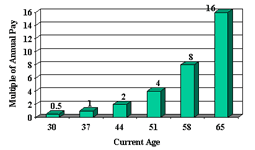|
Preparing
For Retirement
Four
factors will determine your success in reaching your financial goals
for retirement:
- Your age
and how much you have already saved,
- How much
you save in the future,
- How much
your money earns,
- How long
you work.
Your Age
And How Much You Have Already Saved
Nothing
can be done about your current age and how much you have already
saved. No one can turn back the clock! If you already have savings,
it should be considered when thinking about your retirement picture.
Compass, our unique retirement planning tool, lets
you enter how much you already have saved and how it is invested
so it can be properly considered in your retirement planning.
How Much
You Save In The Future
This area of 401(k) planning is vitally important, yet doesn't
receive much attention. We hear a lot about investment returns,
day-trading and web interactivity, but little about how much you
save. Most experts agree that you need a retirement nest egg of
16 times your annual pay when you retire (not including the discounted
present value of Social Security benefits, which will range from
1 to 8 times pay for most people).. In other words, if you are making
$100,000 per year when you retire, the accumulated value of your
retirement account needs to be 16 x $100,000 = $1,600,000. If you
are making $50,000 per year when you retire, the accumulated value
of your retirement account needs to be 16 x $50,000 = $800,000.
The chart below
shows how much you should have at various ages to accumulate a Retirement
benefit equal to 16 times your annual pay at age 65:

So how do you
do this? What if you are woefully behind? Here are a few tips:
- If you can't
start big, start small. A 25-year-old making $25,000 a year who
contributes just 1% of his pay, less than $5.00 per week, to a
401(k) Plan will have $285,000 at age 65. This example assumes
a 3% raise in pay each year, a 50¢ company match, and a net
annual investment return of 10.75%.
- Increase
your contribution each time you get a raise. Tell your employer
that you want your 401(k) contribution to go up 1% each time you
get a raise.
How Much
Your Money Earns
Good investment earnings are a critical component of a successful
retirement plan. If our 25 year old who is contributing just 1%
of his $25,000 annual salary earns a net return of 8.75% annually
instead of 10.75%, he will have $173,000 instead of $285,000 (Almost
40%!). A reduction of two percentage points cuts the retirement
benefit nearly in half. Earning adequate investment returns is
as
crucial to your retirement plan as saving enough.
The internet
is full of investment advice. Fool.com gives basic investment advice
in easy-to-understand language. ScottBurns.com is another good source
of a broad range of advice. Most of the big mutual fund companies
have their own websites that offer free advise, as do the money
magazines such as Kiplinger's (Kiplinger.com).
What if you
don't have time or aren't interested in becoming a financial expert?
Our 401(k) Plans include a Professionally Directed Investment (PDI)
option. PDI let's you leave the decisions relating to the investment
of your 401(k) up to a team of professional investment managers.
How Long
You Work
People entering the workforce today will probably not retire at
age 65. As life expectancies continue to increase, we will work
longer and longer. Working a few more years can have a dramatic
impact on our savings. Our 25-year-old who is contributing just
1% of his $25,000 annual salary and would have $300,000 at age 65
would have $413,000 if he worked until age 68! Working a few years
longer may be a way to offset getting a late start in savings.
|

